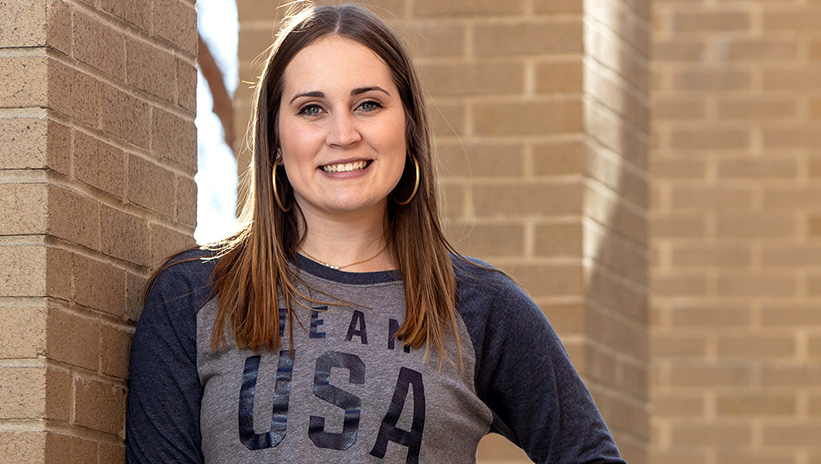Publisher's note: The author of this post, Doug Boyd, is a contributor to ECU News Services.
Emma O’Brien used an undergraduate research grant to study barriers to sports participation among Pitt County youth. | Photo: Rhett Butler
Sports Illustrated has called Greenville a "Sportstown USA," and while opportunities abound for youth and adults to play and learn, those doors aren't equally open to everyone.
That's what East Carolina University student Emma O'Brien found when she studied barriers to local youth sports participation while working as an intern last spring with Greenville Recreation and Parks.
O'Brien, a senior business management major and
EC Scholar from Wake Forest, was one of 32 students who received Undergraduate Research and Creative Activity awards in 2019. Her goal was to identify barriers to youth sports for families in the Pitt County community.
O’Brien interned this past fall with the U.S. Olympic Committee in Colorado. | Photo: Contributed
O'Brien recruited 20 Pitt County families for the study. She conducted interviews and focus groups with parents who receive a scholarship for their child to play sports with GRP, families who were applying for financial aid with GRP and families who do not participate in youth sports because they don't know financial aid exists.
She found several recurring themes: lack of knowledge about the aid programs, transportation issues, costs, ineffective communication and marketing, and lack of parental buy-in.
"Within every focus group, the conversation of high costs to participate came up frequently," she said.
"Families stated that not only is there a fee to participate, but there are many other costs associated with playing as well. Families must provide all equipment and uniforms, besides the jersey or T-shirt provided. Buying cleats, bats, socks, balls, pads and more every season can become very expensive, especially if you have multiple children."
Transportation was the second most common barrier among families. Many families do not have access to a car, making getting their child to and from practice and games nearly impossible.
"Other families do have access to a car but have a family member that works night shifts or weekends," and therefore isn't home to take children to practices and games, O'Brien said. GRP does not offer transportation.
She also found that while GRP sends out a lot of information online, it misses families who don't have regular Internet access. Others said they never see the paper flyers posted about programs.
"Families had no idea that scholarships even existed due to lack of marketing to all members of the community," O'Brien said.
According to Don Octigan, GRP assistant director, nearly 6,500 youth and adults participated in sports and other programs during fiscal year 2018-2019. Sports programs ranged from baseball to flag football to basketball to clinics in gymnastics, golf and more. Other programs include arts and crafts and exercise classes.
Of those, 61 youth used the department's financial-assistance program, Octigan said. That means they paid only $10 rather than the usual $40 per program.
Octigan called O'Brien organized and smart about the way she went about researching the barriers to participation.
"She had initiative and was a go-getter," he said.
"To be honest, I wish she could have stayed with us longer to improve some processes for our financial-assistance program."
O’Brien will graduate in December. | Photo: Rhett Butler
He said the department is using the information O'Brien gathered to look for ways to improve access to programs, including community fundraising. And O'Brien hopes her findings can help other communities figure out ways to make their sports programs more accessible.
"What I appreciate about Emma was she was able to look past the common myths and assumptions about sport and search for solutions," said Stacy Warner, a professor of sport management and sport studies at ECU and O'Brien's mentor on her research project.
"The No. 1 predictor of youth sport participation is parental income. U.S. sport is not for all; rather, it is now geared towards only those with the means and talent. Emma gets that 'sport' isn't just a trivial activity, but rather can be a powerful tool for social change."
O'Brien said she loves doing research.
"I would describe myself as a very curious person, so research allows me to discover answers to big questions or topics I am interested in," she said. "As I have discovered with this project, research also provides reasoning for why positive change should be made in the community. I would like research to continue to be part of my career in the future in some way, shape or form."
O'Brien spent the fall as an intern with the United States Olympic and Paralympic Committee in Colorado Springs, Colorado. There, she worked for all nine business units at USA Triathlon, ranging from finance to sport development to the foundation. Working with the Olympic organization has long been a dream of hers, she said, especially so close to the 2020 Tokyo games.
The daughter of a former ECU swimmer, O'Brien played many sports when she was growing up. And it was a study-abroad trip to New Zealand focusing on sport for social change that rekindled her love of sports.
"It really opened my eyes to all the job opportunities in sport and helped me direct my passion for making sure everyone lives an active lifestyle into a career choice," she said.
She will graduate from ECU in December and plans to work for a few years before applying to graduate school abroad.



